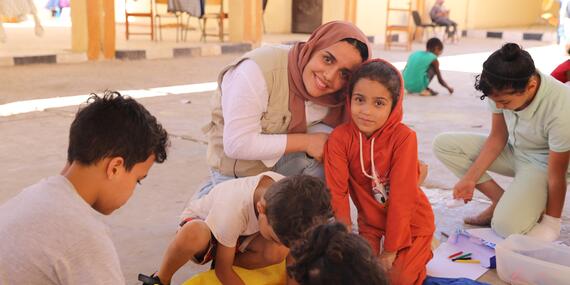Today's top news: Libya, Niger, Sudan

Libya
Following the catastrophic flooding in Libya, more than 125,000 people have been reached with life-saving assistance – including food, water and health items. More than two dozen UN agencies and humanitarian partners are on the ground, helping set up field hospitals and water tanks, and providing protection services.
People affected by the floods say they need affordable food and housing assistance, as well as access to health care, banking services, psychological support and safe drinking water.
We and our partners are also working with authorities to rehabilitate schools before the academic year starts on Sunday. The floods impacted 117 schools. Nineteen other schools are being used to house people internally displaced by the disaster.
We are appealing for US$71.4 million to help a quarter-million people in Libya over the next three months, but the plan is just 18 per cent funded so far.
Niger
OCHA is concerned by flooding, particularly in the south of the country, as heavy rains continue.
Last week alone, 13,000 people were affected.
Since July, according to the Ministry of Humanitarian Affairs, some 160,000 people have been affected, with 51 deaths. More than 14,000 houses have also collapsed.
De facto authorities and aid agencies continue to support the response and have distributed mattresses, mosquito nets, blankets and other essential supplies. More than 13,000 families have also received food support.
Our colleagues on the ground warn that major gaps persist, particularly in the areas of shelter, water and sanitation, and health.
Aid agencies are also working with communities on floods preparedness.
In July and August, for example, the UN Food and Agriculture Organization dug more than 4,000 meters of dykes in Diffa and Maradi, protecting 170 hectares of land from river runoff.
Outreach campaigns reached more than 100,000 people with disaster risk reduction messages.
Sudan
OCHA is alarmed over the spread of cholera in the country.
An outbreak has already been declared in the eastern state of Gedaref – and investigations are now underway to determine whether cholera has also spread to Khartoum and South Kordofan. The World Health Organization (WHO) says there have been increasing reports of acute watery diarrhea in both states.
In Gedaref, more than 260 suspected cholera cases have been reported, with 16 associated deaths.
Even before the outbreak was declared, WHO was providing critical supplies – including antibiotics, IV fluids and rehydration solution – to six states in Sudan, including Gedaref, Khartoum and South Kordofan.
The agency is now deploying rapid response teams to affected areas and supporting efforts by the Ministry of Health to scale up access to clean water and sanitation facilities.
